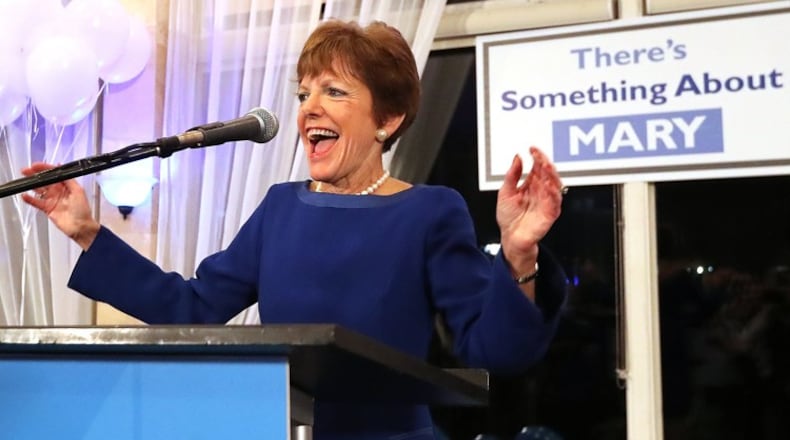Mary Norwood says she’s a bit rusty in giving interviews, what with her being out of the political fray for a year.
Last December, she suffered a nail-biting loss in her ongoing quest to become Atlanta's mayor, losing to losing to Keisha Lance Bottoms by 832 votes out of 94,000 cast, garnering 49.58 percent. (Those stats rolled off the tip of her tongue.)
In 2009, she came up 714 votes short out of 84,000 cast to lose to Kasim Reed. Both elections were bitter, racially divisive brawls. So I can see how anyone, even the eternally optimistic Norwood, would want to slip away to nurture a battered psyche.
But after spending time with her last week, I saw no such drop-off in Norwood’s storied art of stating her own case.
Norwood is still a force of nature, an impeccably coiffed 66-year-old with her trademark Southern charm perpetually dialed to 11. She still chattered at a rapid pace, often speaking of herself in the third person while spitting out facts and figures and backstory — lots of backstory — as we drove around her neighborhood, the tony Tuxedo Park community in Buckhead.
Norwood drives her Lexus like she tells a story: It starts fast, veers suddenly, slows down and eventually arrives at a destination. The purpose of this cruise was to show me infill development popping up in her neighborhood, something seen across Atlanta, although property price tags here often carry an additional zero.
Norwood is aching for something to do and is back at what she does best, community activism. Actually, she prefers the term community “advocacy.” The word “activist” conjures up chanting crowds with signs outside City Hall. “Advocate” brings to mind someone who fits more comfortably in the marble hallways of power.
“My husband (a retired doctor) says this, and it’s grammatically correct: ‘Mary doesn’t do nothing well,’” she said.
To prevent Mary from doing nothing badly, she was recently picked to head the Buckhead Council of Neighborhoods, which represents 44 neighborhoods. (Who knew Buckhead was so expansive.) The job will provide a platform where Norwood can respond to residents’ complaints, interface with community and political leaders, build coalitions, wage battles and make more Mary fans.
Perhaps it’s a reboot to get her political mojo going again?
“I can’t possibly look into the future and think that would make sense right now,” she said. Never say never.
This fall, before agreeing to head the neighborhood coalition, Norwood jumped into a local battle in her community to stop construction of 23 townhouses (the $1 million-plus variety). Building on the 2-acre site on Blackland Road near Roswell Road — the location of a former landscaping company — would accelerate flooding and is not in character with the adjoining community, which has many old, stately estates, Norwood contends.
Neighbors and the developer are haggling over what might be a suitable number of homes.
“I don’t want it to seem Mary will stop everything,” Norwood said. “I’m not anti-development. It’s about neighborhood quality of life.”
Carl Westmoreland, the developer’s attorney, has known Norwood for decades and said, “We’re happy to provide her a chew toy.”
This issue, Westmoreland said, “is the tip of a much larger iceberg.” As Atlanta keeps growing, the question of what kind of housing is appropriate will be asked in neighborhoods rich and poor, black and white.
Norwood knows that and has built up connections citywide. Last time I rode around with Norwood was on the south side, an area that she knows well through her three terms on the Atlanta City Council, where she represented citywide posts.
The current Tuxedo rezoning fight might sound like déjà vu all over again because a similar issue kicked off her public life. In 1990, Norwood was president of her neighborhood association and got involved in a fight to curtail infill development, saying it threatened the neighborhood’s character.
She tried to get a historic designation for the neighborhood but it failed by one vote on the City Council. The Atlanta Journal-Constitution story after that failed effort started off by saying, “Mary Norwood … is no quitter.”
In the following months, she worked to get historic designations for other neighborhoods, sat on the city’s planning advisory board, worked on an economic development task force, and led something called RIOT (Rollback Increase in Taxes), a group that hounded Fulton County leaders.
The volunteering led to an age-old decision point that public activists often wrestle with — the idea that I can do this better than the mope who’s in office.
Her council stints begat her stabs at becoming Atlanta’s Big Enchilada. In 2009, the city went with the usual black-white split, enough to keep Norwood just short of her prize.
Last year, it seemed as if demographics might help her — the city's population had gotten whiter. But she had another problem: Donald Trump.
In one forum she didn’t tear into him like all the other candidates did, leaving voters to wonder whether she was a closet Republican, a charge levied and denied in both mayoral campaigns.
But the whispers were enough to fuel the suspicions of Atlanta’s Trump-hating voters and keep them from joining Team Mary.
In fact, if Hillary Clinton were president, I’d wager Norwood would be mayor.
Hints of Republicanism follow Norwood. Last month, GOP legislators tried to appoint her to the Fulton County election board but the Dems stopped the process, calling the move sneaky.
So now she’s back in the realm, although conventional wisdom says she’s a two-time loser who will be well north of 70 if Mayor Bottoms serves two terms.
I called former City Council President Ceasar Mitchell, who served three terms on the council with Norwood and also ran unsuccessfully last year for mayor.
She’s past her political prime, right?
“I dunno,” Mitchell said with a laugh. “It would be a great underestimation of her popularity that her time has come and gone.”
About the Author
The Latest
Featured





